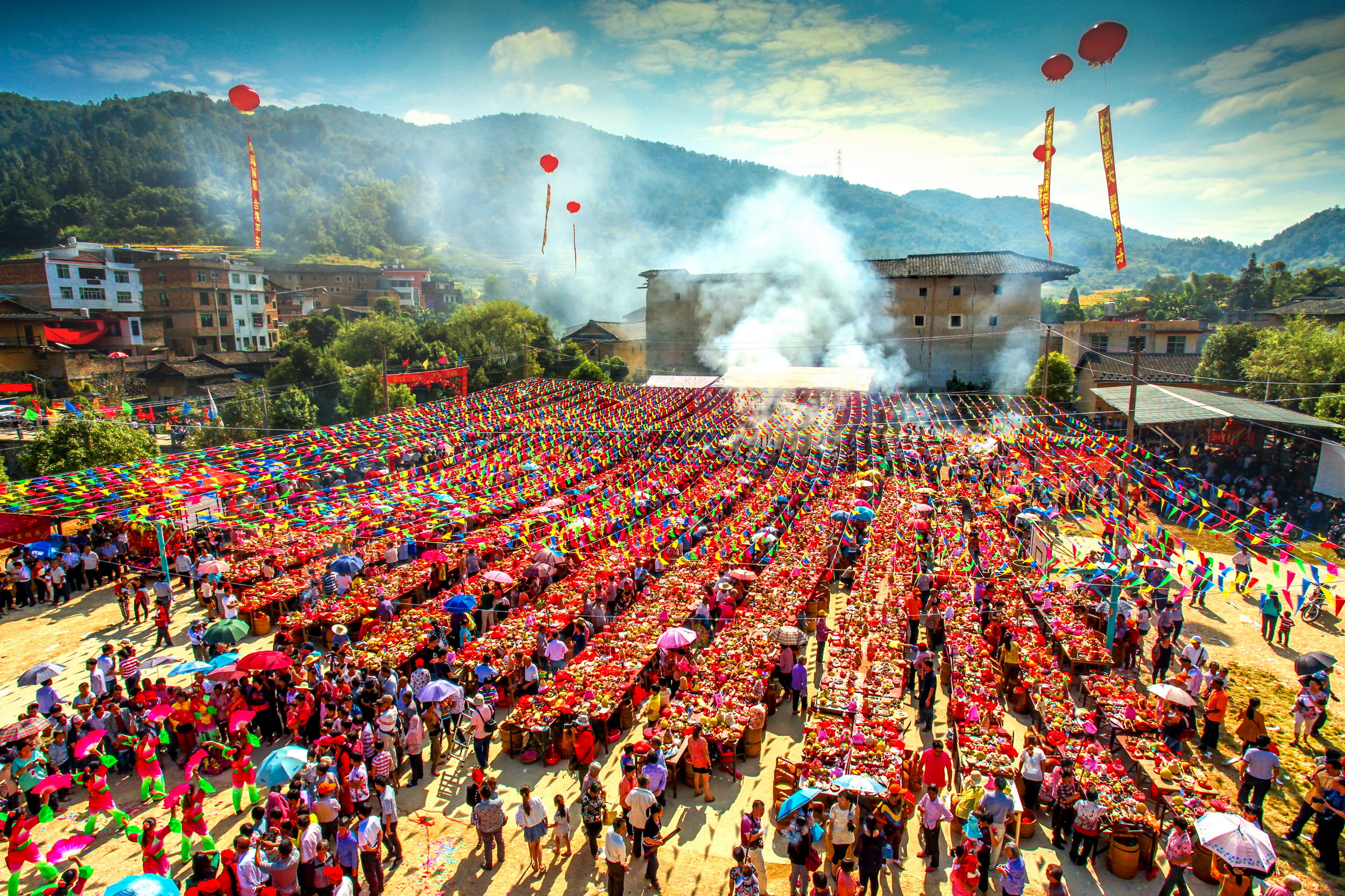
It is said that at the end of the Ming Dynasty, a plague was prevalent. One day, five children from Hu Keng went into the river to play in the water. Suddenly, they all became lively and jumped all the way to the front of Ma 'e Palace, muttering to themselves that if they wanted the Great Emperor Bao Sheng to leave the palace on the 15th day of the ninth lunar month to subdue the epidemic, they must first fast for five days. So the villagers followed this, and the plague was 禳解. To repay the kindness of the Great Emperor Baosheng, after the Chongyang Festival every year, villagers perform performances to honor the deities and express their gratitude. It is very grand and has gradually evolved into a "Great Blessing" event held once every three years. On the tenth day of the ninth lunar month in the year of great fortune, the whole village began to fast. On September 11th, the "public Kings" of each village first gathered at the Ma 'e Palace. Ma 'e Palace is a small temple, standing on a gentle slope southwest of Hukeng Town. It is named so because the back mountain resembles a horse's forehead. The main deity enshrined in the palace is "Kang Taibao Liu Hangong Wang". At 9 o 'clock in the morning, three times 铳响, the princes and Kings set off in their sedan chairs one after another, heading for the Great Fortune Field. In an instant, the sound of drums and music filled the air, fire cannons and firecrackers shook the heavens and the earth, the procession was grand and imposing, banners hung out the sky, and people came in a bustling crowd to watch the spectacle. The young man carrying the divine palanquin was dressed in yellow clothes and blue trousers. Wearing a red belt and a red headscarf, he walked unsteadily. Those who blew and fought, those who fired lances, those who carried large flags, those who waved small flags, those who carried "stories", those who danced lions, and those who carried incense baskets - one village, one team, followed the divine sedan chair slowly. The Dafu Farm is located on an empty piece of land in the village. At the east end is the altar, with a screen placed in the middle. The screen is a gift bestowed by a famous scholar of the Li family from Hukeng during the Qing Dynasty. In front of the screen is the altar of "Kang Taibao Liu Hangong Wang". At the west end, a large stage was set up. To the south, there was a venue for the performance of the wind and singing troupe and the puppet troupe. To the north, two screens for showing movies were erected and suspended. In the middle was the offering hall, with a white cloth hung above it as a canopy. During the Da Fu period, there were performances every night, including grand troupe plays, puppet shows, films, and singing classes, all presented simultaneously. On the Dafu Field, it was extremely lively. Offering sacrifices is an important part of the Great Blessing. The departure of Emperor Baosheng from the palace was the climax of the Great Fortune. On the morning of the 15th day of the ninth lunar month, the Emperor Bao Sheng, who came from Kan Shi, was treated with great respect as soon as he entered Hu Keng. On the way, the welcoming trumpets, suona horns, big drums and gongs and cymbals were played non-stop.
As soon as one arrives at the Great Fortune Field, the "Three-bar Company" is deafening, the sound of firecrackers rises and falls one after another, and the howling of pigs can be heard from the billowing smoke. This is a sign of breaking the fast and offering meat and fish. All villages offer offerings simultaneously, mainly whole pigs, whole sheep, whole chickens and whole ducks. The offering hall was filled with offering tables, on which there were all kinds of items such as pig heads, liver flowers, chicken, duck, fish, wine, rice noodles, candies and fruits. Here, women from various families show off their skills: the chickens and ducks offered are all in different shapes, the rice on the plate is stacked upside down like a pagoda, and the candies of different colors are pieced together on the plate to form the auspicious pattern of "Happiness, prosperity, longevity and completeness". It is evident that the ingenious craftsmanship and dexterous hands of the women are truly "a thousand pairs of dexterous hands compete in skills, and a sincere heart respects the deities".
Nowadays, the ancient custom of making a great fortune is gradually changing. Besides praying for "favorable weather and a bountiful harvest" and expressing the yearning for a better life, strengthening the friendship among fellow villagers, encouraging hard work to get rich, and awakening the desire of overseas Chinese to return to their hometowns to trace their roots are also increasingly valued by people.

 Be a great blessing-Cultural activities-Fujian Tulou Yongding Scenic Area
Be a great blessing-Cultural activities-Fujian Tulou Yongding Scenic Area